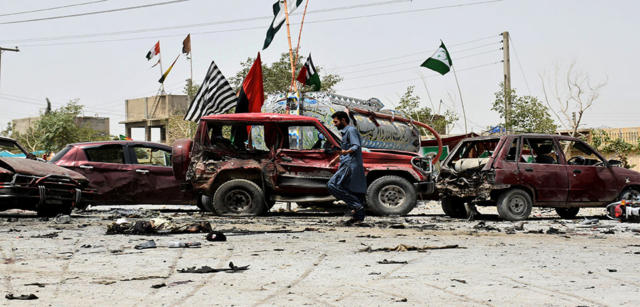A suicide bomber on a motorcycle rammed into people waiting outside a busy polling station in the Pakistani city of Quetta on Wednesday, killing at least 31 and casting a dark shadow on what was to be a historic day for the country as Pakistanis cast ballots to elect their thirds consecutive civilian government.
The attack in Quetta, the capital of Baluchistan province, underscored the difficulties this majority Muslim nation faces on its wobbly journey toward sustained democracy.
The bombing also wounded 35 people, with several reported to be in critical condition, raising concerns the death toll could rise further, said hospital official Jaffar Kakar, a doctor.
Wednesday’s voting for a National Assembly, the lower house of parliament, and four provincial assemblies followed a rancorous campaign marked by widespread allegations of manipulation. Analysts and rights groups have warned of post-election instability and predicted losing parties would cry foul.
The uncertainty of the outcome of the vote — no single party appeared assured of a simple majority win — could also lead to prolonged post-election jockeying that would hamper the forming of the next government.
“Whatever way elections run, I see a lot of instability,” said defense analyst Ayesha Siddiqua, who authored Military Inc., a look at the extensive financial holdings of Pakistan’s army.
A witness to the attack in Quetta, Abdul Haleem, who was waiting to cast his ballot, said he saw a motorcycle drive into the crowd of voters just seconds before the explosion. Haleem’s uncle was killed in the blast.
“There was a deafening bang followed by thick cloud of smoke and dust and so much crying from the wounded people,” he told The Associated Press.
No one immediately claimed responsibility for the bombing but local officials were quick to blame the Islamic State group.
Baluchistan also saw the worst violence during election campaigning earlier this month, when a suicide bomber blew himself up at a political rally, killing 149 people, including the candidate Siraj Raisani. Another 400 were wounded. Voting in that constituency has been suspended.
IS claimed responsibility for that attack, though Baluchistan has seen relentless attacks, both by the province’s secessionists and Sunni militants who have killed hundreds of Shiites living there. In recent years, the IS affiliate in the region has emerged as a major force behind violence, often using local Sunni radicals from the outlawed Lashkar-e-Jhangvi to carry out its attacks.
Citing security concerns, Pakistan’s election commission announced that internet and cellphone services in several Baluchistan districts were suspended. Election commission secretary Babar Yaqub told reporters there were also threats against polling stations, staff and even candidates.
Story by The Associated Press
 CGTN America
CGTN America
